
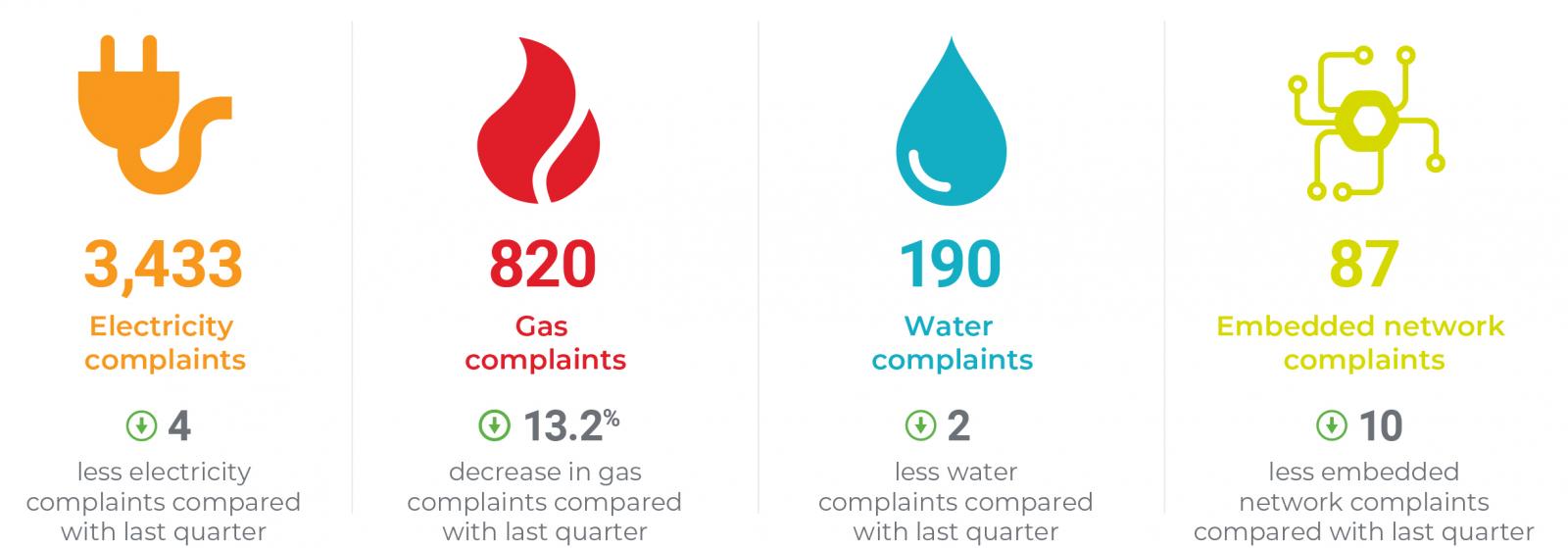
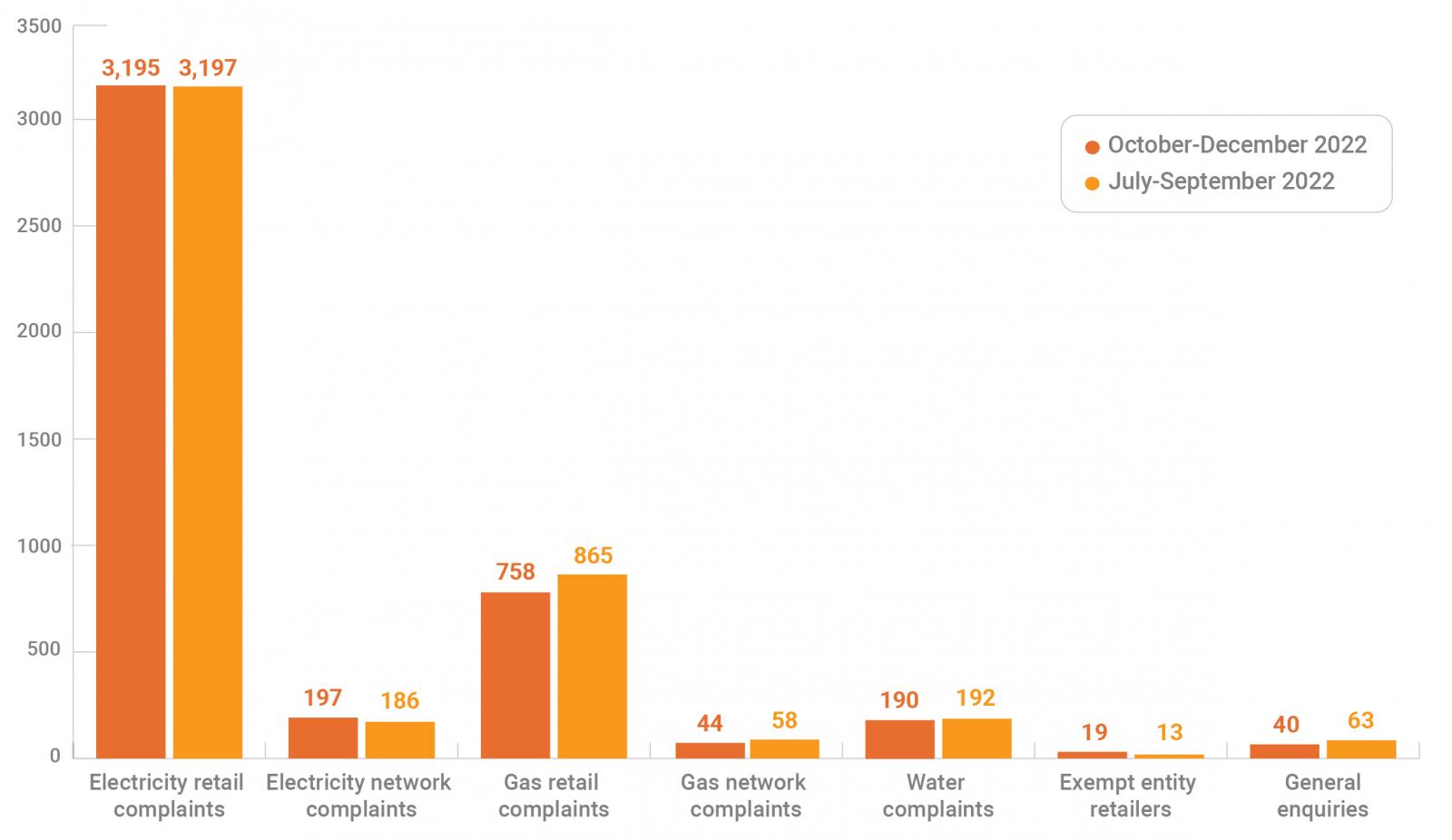

In response to the horrific floods in NSW last year, the Australian Energy Regulator (AER) issued a letter of expectations to energy retailers about how to support flood affected customers. Despite the overall positive response from industry, EWON is still taking complaints from customers whose homes and lives have been devastated. These customers are receiving estimated bills for premises that are uninhabitable, and where the basis of the estimate doesn’t reflect the prior year, as required. I was interviewed by ABC Radio and Channel 9 about this issue in January, where I heard directly from customers, some of whom then contacted EWON for assistance. We’re committed to continuing our support for flood affected customers by increasing awareness of our service and keeping, as requested, the AER informed.
This issue of EWON Insights focuses on high bills, which are stressful for most customers and particularly worrying for customers experiencing affordability difficulties and/or vulnerable circumstances. Today’s economic environment is expanding the number of financially impacted consumers and we are again hearing the term ‘working poor’ bandied about. This report focuses on complaints relating to sharp price increases due to market volatility, and some gas-specific issues.
There is a growing recognition and acceptance across the energy sector that financial impacts arising from increased energy prices, broader cost of living and interest rates need to be mitigated. Positively, the AER’s recently released Towards Energy Equity – a strategy for an inclusive energy market is focused on:
EWON participated in consultations leading up to the release of the report, and I continue to be involved in the AER design team’s work. Our focus is on identifying potential “game changer” solutions and reforms which support customers experiencing, or at risk of experiencing, vulnerability. The sector’s input to this work is required to deliver game changing reforms.
We are also continuing to contribute to the Department of Social Services consultation on a funding model to ensure sectors including banking, telecommunications, energy and water appropriately contribute to the funding of financial counselling services so that customers can continue to access this important resource. My vision is to see energy affordability reforms implemented so successfully that the demand for financial counsellors is reduced to the point that funding is no longer required.
Janine Young
Ombudsman & Chief Executive Officer
Energy & Water Ombudsman NSW

For the top core issues, including the previous four quarters, click here
Each complaint EWON receives has a core issue – the driver of the complaint, and may have other associated issues. In this quarter EWON closed 4,600 complaints and received 4,471.
In our July to September 2022 EWON Insights we marked a significant increase (30.1%) in complaints from the previous quarter and we are yet to discern if the increase was the result of ongoing economic pressures or seasonal impacts.
While complaints for the October to December 2022 quarter were marginally lower (2.6%), this slight decrease does not take into account reduced number of working days due to the EWON Christmas closure period. The daily average complaints received remains consistent, indicating that the current level of complaints may continue.
To further highlight the impact of economic pressures being the cause of the upward trend in complaints, in the October to December 2022 quarter:
We have also seen the emergence of ‘Disconnection/restriction impending’ in the top 10 core issues, indicating that more people are struggling with account balances.
For the top 10 issues, including the previous four quarters, click here
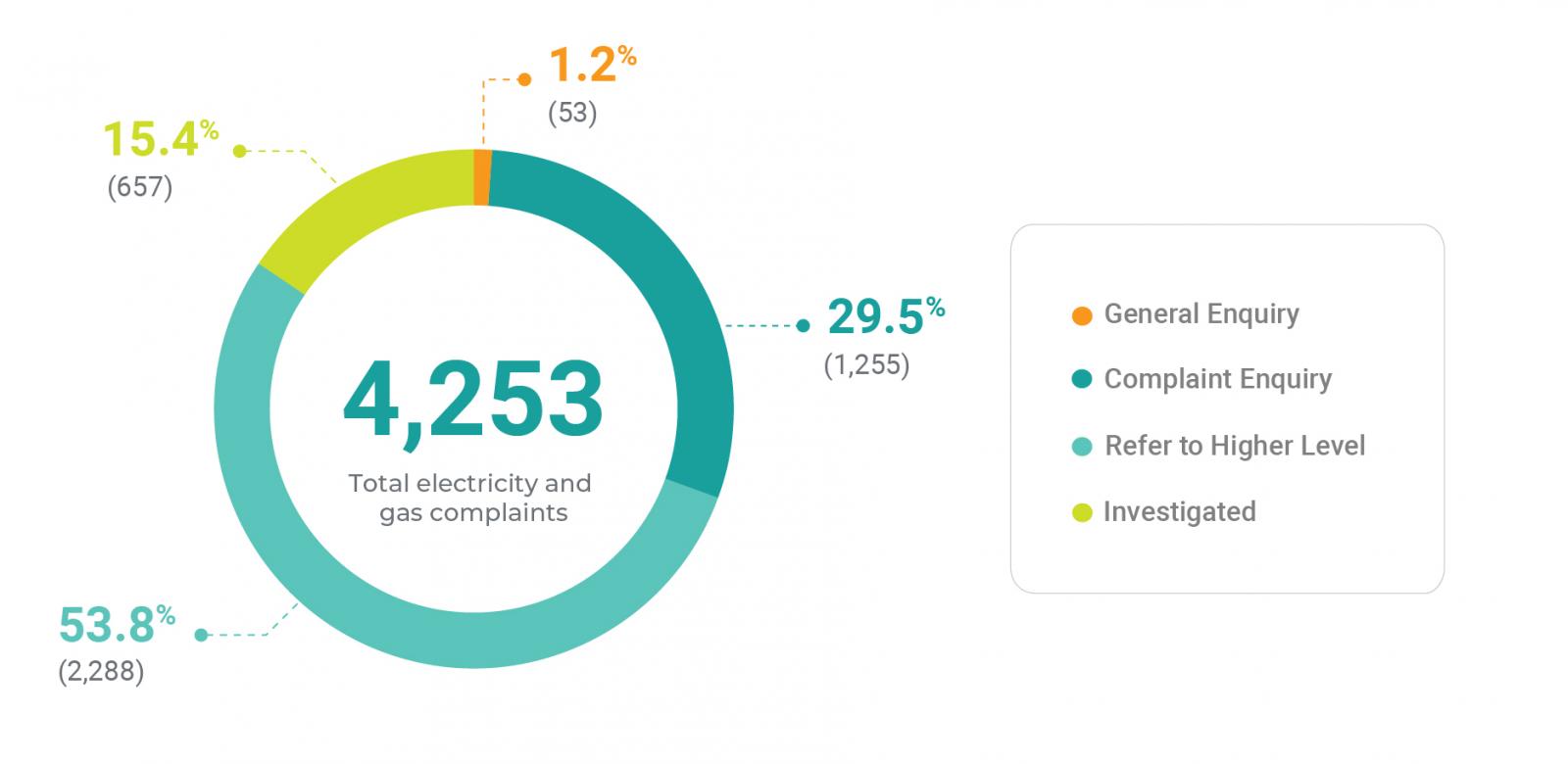
Table 4 – Energy complaint breakdown October to December 2022
|
Complaint type |
Number of complaints |
% total energy complaints |
|---|---|---|
|
General enquiry |
53 |
1.2% |
|
Complaint enquiry |
1,255 |
29.5% |
|
Refer to higher level |
2,288 |
53.8% |
|
Investigated |
657 |
15.4% |
|
Total |
4,253 |
100% |
Customers complaining about high bills is the most common complaint that EWON receives. EWON received a 58.3% spike in high bill complaints in the July to September 2022 period, a trend which has slowed in the October to December 2022 period, which still saw a 16.0% increase.
Traditionally EWON receives a rise in complaints about bills that relate to increased usage during cooler periods because customers are often unaware of the energy consumption of their appliances. There have also been price increases in the past 12 months due to wholesale market volatility which has also impacted customers’ bills.
There are many causes of high bills, including poor insulation or a faulty appliance using more energy.
The first case study below demonstrates that even the anticipation of a high bill can have a negative impact on a customer with limited income. The second case study shows that vulnerable circumstances can make it difficult for a customer to navigate the energy market, including disputing a high bill.
 Customer worried about receiving delayed high bill
Customer worried about receiving delayed high bill
A customer moved into a rental property in January 2022 and established an electricity account. She provided her Centrelink details to receive the Low Income Household Rebate. In April 2022, she had not yet received a bill so she contacted the retailer who said it would follow up internally with its billing department. The customer did not hear anything further and continued to follow up every few weeks but by July 2022 she still had not received a bill.
She was worried that the bill would be high, because of the longer than normal period and the lack of opportunity to review her usage or make sure she was getting the Low Income Household Rebate. EWON referred the complaint to the retailer at a higher level, however the customer returned as she had still not received a bill.
EWON’s review found that there was a non-residential tariff assigned to the property incorrectly. Due to the mismatch, the account was not correctly set up and bills were not issued. The retailer liaised with the network to have the tariff corrected to residential and established a residential account commencing 1 June 2022 with the customer’s informed consent.
 The retailer issued billing for the period 1 June 2022 to 4 October 2022 with the Low Income Household Rebate correctly applied. The customer was not required to pay for usage between January 2022 and June 2022. The retailer had already applied a total of $200 in customer service credits while dealing with the complaint directly, so the account was in credit by just over $50 after the billing was issued. The customer was happy with the outcome and aware she could contact the retailer to discuss a payment arrangement once she received her next bill. She was also advised she could access assistance such as EAPA vouchers in the future.
The retailer issued billing for the period 1 June 2022 to 4 October 2022 with the Low Income Household Rebate correctly applied. The customer was not required to pay for usage between January 2022 and June 2022. The retailer had already applied a total of $200 in customer service credits while dealing with the complaint directly, so the account was in credit by just over $50 after the billing was issued. The customer was happy with the outcome and aware she could contact the retailer to discuss a payment arrangement once she received her next bill. She was also advised she could access assistance such as EAPA vouchers in the future.
High energy bill complaints have increased to pre-COVID levels over the last two quarters. This jump has been partly driven by customers responding to sharp increases in the prices of electricity and gas throughout this year. The increased energy bills were largely driven by increased costs within the wholesale energy market, resulting from a range of international and domestic pressures.
Although complaints to EWON illustrate how retailers have been impacted differently by the increased wholesale energy prices, some retailers, particularly those with smaller customer bases, have responded by passing multiple price rises on to their customers. Retailers were proactive in warning customers of future price rises, some even recommending that their customers transfer to a new retailer to obtain a better offer, but this has not prevented customers from complaining about receiving three or more price rises in a single billing period.
 Retailer recommends customer transfers after price increases
Retailer recommends customer transfers after price increases
A customer was notified by email of three separate price increases that would be applied to her next electricity bill. She then received her monthly electricity bill for $225 which was higher than she expected so she contacted her retailer to request a review of the bill and to question the price increases.
The retailer confirmed the bill was correctly calculated and offered the customer a 33% discount on the bill. The customer did not accept this, so the retailer recommended that the customer transfer her electricity account to a new provider. The customer complained to EWON that the retailer had not adequately reviewed the bill, and that the price changes were not clearly notified.
 We referred the matter to the authorised retailer, for resolution at a higher level with the customer’s acceptance knowing she could return to us if he was unhappy with the outcome.
We referred the matter to the authorised retailer, for resolution at a higher level with the customer’s acceptance knowing she could return to us if he was unhappy with the outcome.
 Customer experiences 80%-100% price increases
Customer experiences 80%-100% price increases
A customer complained to EWON that their energy retailer had increased prices three times in as many months. The price rises equated to an 80% increase to the price of peak electricity consumption, and a 100% increase to the price of off-peak electricity consumption. The customer advised EWON that his next quarterly energy bill had doubled despite including around $160 in discounts.
 We advised the customer that we could not investigate a complaint about price setting by retailers. However, we also referred the matter to the retailer at a higher level, so they could respond to the customers complaint.
We advised the customer that we could not investigate a complaint about price setting by retailers. However, we also referred the matter to the retailer at a higher level, so they could respond to the customers complaint.
Gas bills can increase due to leaking hot water systems or an undetected leak. In apartments it can sometimes be due to a misalignment with the meter data logger (where a meter transmits a read to a remote logger in the building via a communications cable) which shows the bill as actual, however is not accurately recording the consumption.
 Incorrect setup leads to high gas bill
Incorrect setup leads to high gas bill
A customer received a bill for his hot water and unmetered gas for the period 7 February 2022 to 5 May 2022 which he considered to be high. He thought that both the meter reading and the calculation of the usage were incorrect as the reading was calculated in litres, not decalitres.
He contacted his retailer on several occasions between May and July 2022 and it said the bill was correct, so he contacted EWON for further assistance. EWON initially referred the complaint to the retailer for resolution at a higher level, however the retailer did not resolve the issue so the customer returned to EWON.
During EWON’s investigation the gas distributor attended the customer’s property and found that the remote reading facility used to bill the customer’s hot water usage was connected to another property. This was rectified during the visit and the retailer reversed all bills and rebilled the customer on the correct meter, including correcting the reading to include decalitres from the meter.
 The customer’s account was now in credit by $95. The retailer also applied a $250 customer service gesture and letter of apology for the inconvenience caused.
The customer’s account was now in credit by $95. The retailer also applied a $250 customer service gesture and letter of apology for the inconvenience caused.
 Customer requested to ‘wake up meter’
Customer requested to ‘wake up meter’
In July 2022, a customer received an estimated gas bill for over $900. He thought the bill was high as his previous gas bills never exceeded $130 per quarter. He contacted his retailer which said it would investigate and place a hold on his account.
The customer then received a disconnection notice, so he contacted the retailer again which advised there was an issue with his meter which needed replacing. However, he was then told the problem was with the cable, not the meter. Both were replaced but he continued to receive estimated gas bills. The retailer advised the customer to contact the gas distributor and in August 2022 he received another notice stating he would be disconnected on 26 August 2022.
The customer contacted EWON for further assistance as he was concerned about disconnection. EWON contacted the retailer which said the gas distributor had attended the property in August 2022 and found that the hot water meter had been undercharged but the gas meter had been overcharged. It also said one of the gas meters was not connecting with a meter data logger and requested that the customer press a red button on the meter to ‘wake it up.’ EWON requested that the customer do this and provide photos of the meter.
 After the customer had sent photos of his meter to EWON, we provided this to the retailer which confirmed that the meter was now receiving actual readings. The retailer issued an amended bill, for usage up to 21 September 2022 for $75, and as a gesture of good will the retailer offered to waive the charges.
After the customer had sent photos of his meter to EWON, we provided this to the retailer which confirmed that the meter was now receiving actual readings. The retailer issued an amended bill, for usage up to 21 September 2022 for $75, and as a gesture of good will the retailer offered to waive the charges.
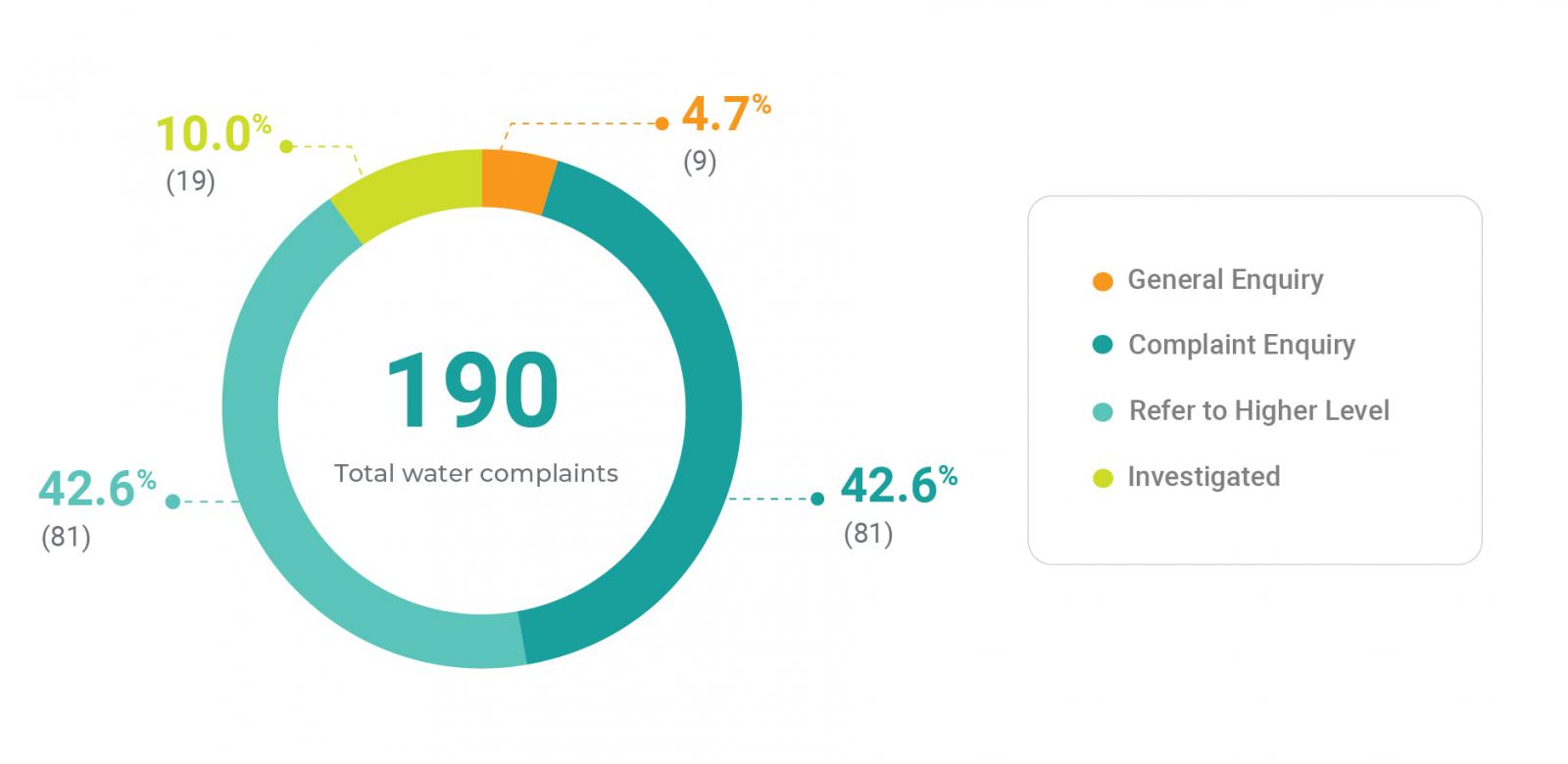
Table 5 – Water issues, October to December 2022, including the previous four quarters
| Primary and secondary issue |
Oct–Dec |
Jul-Sep |
Apr-Jun |
Jan-Mar |
Oct-Dec |
|---|---|---|---|---|---|
|
Billing > high > disputed |
52 |
48 |
26 |
26 |
37 |
|
Customer service > |
44 |
42 |
30 |
19 |
32 |
|
General > energy/water |
29 |
16 |
23 |
19 |
18 |
|
Land > property |
18 |
16 |
19 |
6 |
10 |
|
Customer service > |
14 |
18 |
15 |
22 |
16 |
Table 6 – Water complaint breakdown, October to December 2022
|
Complaint type |
Number of complaints |
% |
|
General enquiry |
9 |
4.7% |
|
Complaint enquiry |
81 |
42.6% |
|
Refer to higher level |
81 |
42.6% |
|
Investigated |
19 |
10.0% |
|
Total |
190 |
100% |
There are a range of assistance programs that residential water customers can access, such as concession rebates, Payment Assistance Schemes (PAS) and payment arrangements. EWON can discuss options with customers, and will often provide referrals, however there are limitations to assistance for businesses.
As water prices are regulated by the Independent Pricing and Regulatory Tribunal, the cause of high bills is not generally attributed to price increases. Factors that can impact a high bill include concealed leaks or affordability concerns. EWON receives many different types of water complaints, however financial disadvantage or vulnerability is a consistent component of many complaints.
 Farmer impacted by undetected water leak
Farmer impacted by undetected water leak
A customer received a high water bill for the period 1 July to 30 September 2021 for over $2,000. He then received another bill for the period 1 October to 31 December 2021 for $300. Both bills were higher than the previous 12 months when his water bills were between $30 to $60. The customer was an elderly farmer significantly impacted by extreme weather conditions.
In February 2022, the water provider contacted him to alert him to a potential leak at the property. Due to the recent weather conditions including excess rain, and the resulting damage to a paddock, it was difficult to locate the leak. The paddock was inaccessible to his vehicles, and he had to hire a local contractor with an excavator to dig access along 500 meters of water pipes between the meter and the residential property that serviced the supply. This cost the customer $700, however the leak was located and fixed.
He contacted the water provider and requested special consideration due to the ground conditions and the financial difficulty that the large bill would place on him. The water provider offered to apply a $500 credit to the account as a good will gesture.
 The customer contacted EWON for further assistance. We referred the matter to the water provider for resolution at a higher level. Due to the circumstances, the water provider applied an additional credit to the account to reduce the customer’s bill to the previous average charge he had incurred before the leak.
The customer contacted EWON for further assistance. We referred the matter to the water provider for resolution at a higher level. Due to the circumstances, the water provider applied an additional credit to the account to reduce the customer’s bill to the previous average charge he had incurred before the leak.
 Restriction notice relating to a deceased estate
Restriction notice relating to a deceased estate
An advocate received a water restriction notice due to an overdue balance of $2,200. He lived at the property alone, was not currently working and was experiencing financial difficulty.
The property was owned by the advocate’s relative, who had recently passed away and the overdue balance was from before the advocate moved in. The owner of the property had been on a payment plan with the water provider prior to their death, however had not paid the account balance.
The advocate had previously contacted the water provider to inform it the account holder had passed away and to request the account be put in his name. He thought the balance would be waived and he would be responsible for future bills. In another discussion the water provider requested he establish a payment plan, or have the debt passed on to the customer’s estate. He did not think that it was reasonable as he was not living at the property at the time the debt was accrued.
The advocate contacted EWON for assistance as he was concerned about the water supply being restricted. EWON explained that water accounts are in the name of a property owner and could not be opened and closed at the request of a person living there. As the advocate would become the owner of the property after his relative’s estate administration process was complete, the water account would then transfer into his name. We advised him to contact the solicitor of the estate to discuss the arrears at the property and probate concerns.
 The water provider placed a hold on the restriction and said it would contact the advocate directly to discuss the account and any eligibility for assistance with the account. The advocate advised EWON that he was happy with the additional information and would speak with the solicitor and the water provider directly.
The water provider placed a hold on the restriction and said it would contact the advocate directly to discuss the account and any eligibility for assistance with the account. The advocate advised EWON that he was happy with the additional information and would speak with the solicitor and the water provider directly.
 Customer misses water license renewal while overseas
Customer misses water license renewal while overseas
A customer was overseas between June 2022 and October 2022 and returned to find a notice from her water provider advising she was required to extend her water licence for another 10 years. The renewal due date was 31 July 2022.
Just after she got back she received a second notice advising a late fee would be applied to the account if there was no application to extend the duration of the licence approval. She received a bill from the water provider for $1,000, which she paid the day after she returned from overseas and wrote to request it waive the late fee due to her circumstances. However, she received a notification in November 2022 saying it would not waive the fee and the full bill was payable.
The customer contacted EWON for further assistance as she did not think it was reasonable to be financially disadvantaged when she did not receive the notices. We initially referred the complaint to the water provider for resolution at a higher level, however the customer returned to us as she did not hear from the water provider.
 EWON contacted the water provider and at its request, provided a copy of the customer’s flight itinerary which showed the dates that she was away from the property. The water provider refunded the late fee of $450 to the customer.
EWON contacted the water provider and at its request, provided a copy of the customer’s flight itinerary which showed the dates that she was away from the property. The water provider refunded the late fee of $450 to the customer.
This quarter EWON opened 87 complaints from embedded network customers.
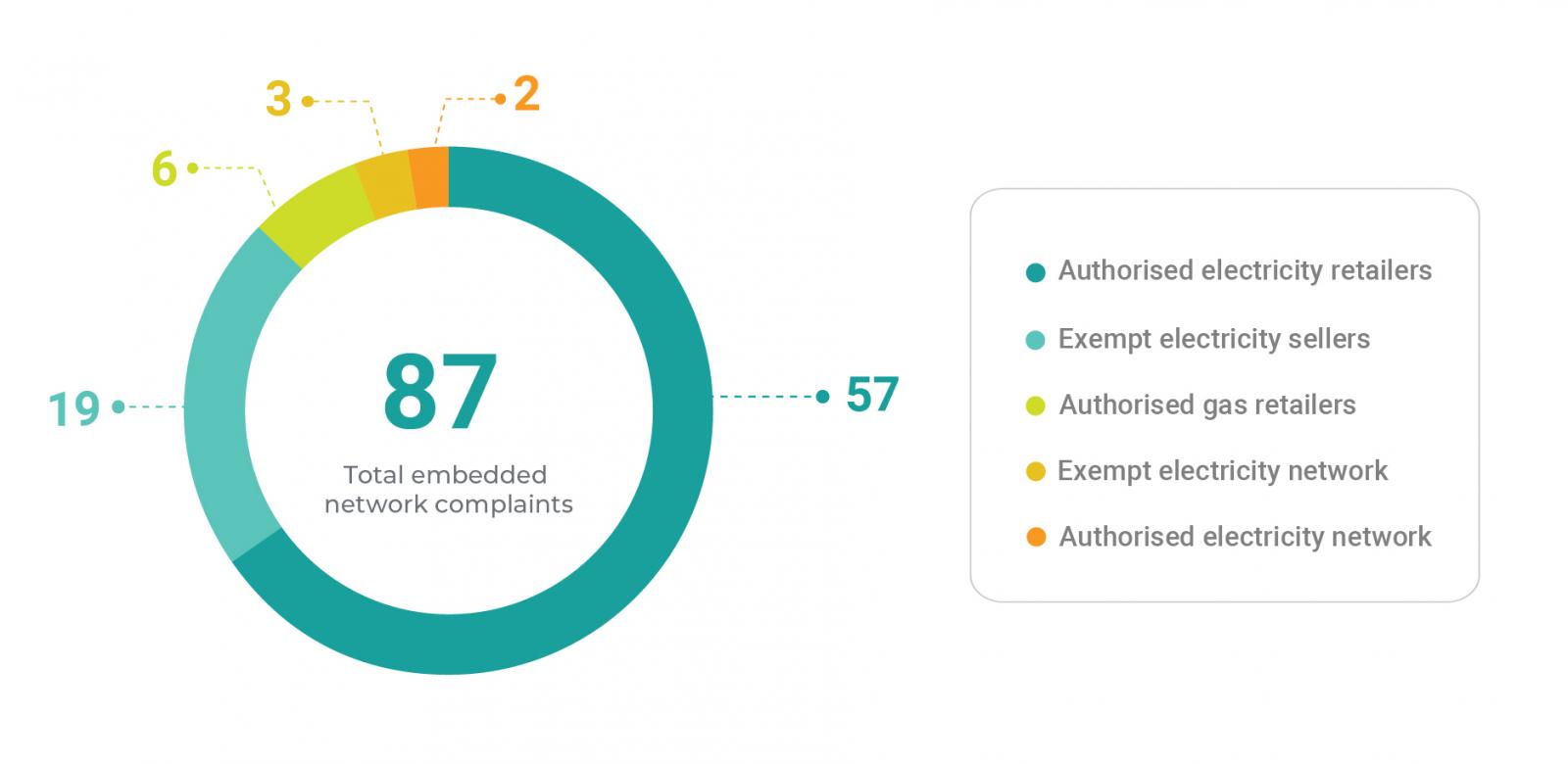
Table 7 – Embedded network customer complaints by service provider, October to December 2022
| Service provider | Complaints by embedded network customers |
|---|---|
|
Electricity > network > authorised |
2 |
|
Electricity > network > exempt |
3 |
|
Electricity > retail > authorised |
57 |
|
Electricity > retail > exempt |
19 |
|
Gas > retail > authorised |
6 |
|
Non energy/non water > not allocated |
0 |
|
Water > retail > WICA |
0 |
|
Total |
87 |
EWON closed 90 complaints from customers whose electricity or gas (including hot water) is supplied through an embedded network.
Table 8 – Top 10 core issues for embedded network complaints closed, October to December 2022
|
Core complaint issues |
Complaints |
|---|---|
|
Billing > high > disputed |
34 |
|
Customer service > poor service |
13 |
|
Billing > contract terms > price increases |
8 |
|
Billing > error > other |
7 |
|
Billing > tariff > rate |
6 |
|
Billing > contract terms > variation in price/terms |
6 |
|
Billing > error > cross-metering |
5 |
|
Billing > fees & charges > other |
5 |
|
Customer service > failure to respond |
4 |
|
Billing > refund or credit > delay/error/form |
3 |
Table 9 – Top 10 issues for embedded network complaints closed, October to December 2022
|
All complaint issues |
Complaints |
|---|---|
|
Billing > high > disputed |
34 |
|
Customer service > poor service |
13 |
|
Billing > contract terms > price increases |
8 |
|
Billing > error > other |
7 |
|
Billing > tariff > rate |
6 |
|
Billing > contract terms > variation in price/terms |
6 |
|
Billing > error > cross-metering |
5 |
|
Billing > fees & charges > other |
5 |
|
Customer service > failure to respond |
4 |
|
Billing > refund or credit > delay/error/form |
3 |
Customers in embedded networks have also been impacted by rising wholesale energy prices however they do not have practical access to retail competition, so cannot switch to a better offer from another energy retailer. This means customers have no option but to pay the price increases set by their current retailer or exempt seller, or the strata corporation can try to renegotiate the selling arrangements within the network.
 Market conditions lead to increased prices
Market conditions lead to increased prices
A customer contacted EWON for advice about the sale of electricity in a residential building. The building was set up as an embedded network and an authorised energy retailer had the rights to sell electricity within the network. The customer was both a resident of the building and the chair of the strata committee. He advised that there was a five year agreement in place with the authorised retailer, and the strata had been notified that the prices for each customer would be increasing by approximately 65% for the final year of the agreement. The customer complained to the energy retailer, and it explained this was due to the increased cost of energy. The retailer offered to review the prices if the contract was renewed for a longer period.
 EWON provided information on embedded networks, and price increases. We also confirmed the provider was an EWON member and advised the customer that, if any future issues relating to billing or provider actions were unable to be resolved, he could return to EWON.
EWON provided information on embedded networks, and price increases. We also confirmed the provider was an EWON member and advised the customer that, if any future issues relating to billing or provider actions were unable to be resolved, he could return to EWON.
 Price change notice and increased rates on bill not consistent
Price change notice and increased rates on bill not consistent
A customer complained to EWON that the rates for electricity consumption applied to his recent bill were not the same as the rates included in his most recent price change notice from his energy retailer. He lived in an embedded network and his retail services were provided by an authorised energy retailer. The customer went to the retailer’s website to confirm what its current energy rates should be and he found the price information had been removed from the website. He called the retailer which confirmed that price information was no longer available. The retailer also advised that a price change notice had been sent to him nine months earlier. The customer complained to the retailer that the prices on his current bill were higher than in the price change notice he had received.
 We referred the matter to the authorised retailer, for resolution at a higher level. The customer returned to EWON after he received no further response from the retailer. EWON contacted the retailer to obtain further information about the customer’s electricity billing. The retailer advised EWON that the prices on the customer’s current bill had increased and he had not been sent a price change notice as required by the National Energy Retail Rules. The retailer agreed to issue a new price change notice that would provide five days’ notice of the price increase. The retailer also agreed to apply a credit to the customer’s electricity account to compensate the customer for the price increase that had not been communicated.
We referred the matter to the authorised retailer, for resolution at a higher level. The customer returned to EWON after he received no further response from the retailer. EWON contacted the retailer to obtain further information about the customer’s electricity billing. The retailer advised EWON that the prices on the customer’s current bill had increased and he had not been sent a price change notice as required by the National Energy Retail Rules. The retailer agreed to issue a new price change notice that would provide five days’ notice of the price increase. The retailer also agreed to apply a credit to the customer’s electricity account to compensate the customer for the price increase that had not been communicated.
Table 10 – Complaints involving behind the meter products by service provider, October to December 2022
|
Service provider |
Complaints opened involving behind the |
|---|---|
|
Electricity > network > authorised |
27 |
|
Electricity > not allocated |
13 |
|
Electricity > network > exempt |
1 |
|
Electricity > retail > authorised |
467 |
|
Electricity > retail > exempt * |
2 |
|
Total |
510 |
* Consumer Energy Resources within embedded networks or exempt sellers offering solar powered purchase arrangements (SPPA)
The term Consumer Energy Resources (CER) refers to energy producing technologies that people use in their homes, such as rooftop solar systems, battery storage systems and electric vehicles. We received at least 510 complaints from customers that own or use CER technologies this quarter which represents approximately 11.4% of all electricity complaints.
For many customers, reducing energy bills can be the main reason for purchasing and installing CER products. CER products can also involve a significant initial financial outlay and/or ongoing loan arrangement. If customers do not see the energy bill reduction they were expecting, unsurprisingly it can lead to complaints.
 Customer received high estimated bills after upgrading solar
Customer received high estimated bills after upgrading solar
A customer received an estimated electricity bill of over $2,000 for the period 8 May 2021 to 6 August 2021, based on an average consumption of 104 kWh per day. He received another estimated bill for the period 7 August 2021 to 5 November 2021 for over $2,000, with a daily average of 95 kWh. He considered the bills were high compared to his actual bill for the period 10 February 2021 to 7 May 2021 for $570, with a daily average of 29 kWh. The solar generation on the disputed bills had also more than halved compared to previous actual bills. His solar system had been upgraded to a 10-kW system in July 2021, which also required a meter upgrade. He had expected his bills to decrease due to this upgrade.
He contacted his retailer about his concerns and it said the bills were appropriate. He raised a complaint with EWON and we referred it to the retailer at a higher level. The customer returned to EWON as his complaint had not been resolved. He had been reviewing his subsequent bills and monitoring his usage on the retailer’s phone app. His usage since October 2021 was significantly lower than the estimated usage on the two disputed bills. The customer had paid all subsequent undisputed bills through to mid-2022.
 EWON’s investigation found that the retailer was provided with the appropriate solar upgrade paperwork in July 2021, but a new meter was not installed until October 2021 due to errors by the retailer. The retailer acknowledged the financial disadvantage to the customer and offered a settlement of $614 for missed solar credits. However, the retailer did not address the high estimated usage. EWON’s review indicated that the estimated usage was higher than both historical actual usage and actual usage since the new meter had been installed.
EWON’s investigation found that the retailer was provided with the appropriate solar upgrade paperwork in July 2021, but a new meter was not installed until October 2021 due to errors by the retailer. The retailer acknowledged the financial disadvantage to the customer and offered a settlement of $614 for missed solar credits. However, the retailer did not address the high estimated usage. EWON’s review indicated that the estimated usage was higher than both historical actual usage and actual usage since the new meter had been installed.
EWON liaised with the network which provided the retailer with revised estimated meter data for the period 8 May 2021 to 28 October 2021. The retailer then applied an adjustment credit of $2,760 to the account based on this revised data. EWON’s calculations indicated that the customer was entitled to a further adjustment of $270, which the retailer agreed to apply. The retailer also applied a customer service credit of $200. With the total of $3,230 in credits applied, the customer’s account balance reduced to $300. The customer was required to complete paperwork for the settlement, after which he would receive the further $614 credit. The customer was satisfied with the outcome of his complaint.
 Customer with rooftop solar disputes high winter bill
Customer with rooftop solar disputes high winter bill
A customer received an electricity bill for the period 18 July 2022 to 20 October 2022 for $1,375 which he was higher than expected. He considered his bills were usually between $500 and $1,000 per quarter. He had 20 solar panels on his roof and had recently paid to have them cleaned and checked to ensure they were operating efficiently. He contacted his retailer to dispute the bill, but it advised him that the bill was correct and payable as it was based on an actual read. He raised a complaint with EWON, and we referred it to the retailer at a higher level.
 The customer returned to EWON as his complaint had not been resolved. EWON’s review found the bill was for the winter period when the customer was using more energy for heating and the rooftop solar was generating less energy due to fewer sunny days. The average daily usage of 45 kWh per day in the disputed period July to October 2022 was similar to the average daily usage of 43 kWh in the corresponding period the year before from July to October 2021. The dollar amount of the bill for the period July to October 2021 had been lower at $1,070 because the energy prices had been lower. To resolve the complaint, the retailer offered to apply a credit of $375 to reduce the disputed bill to $1,000. The customer accepted the credit to resolve the complaint.
The customer returned to EWON as his complaint had not been resolved. EWON’s review found the bill was for the winter period when the customer was using more energy for heating and the rooftop solar was generating less energy due to fewer sunny days. The average daily usage of 45 kWh per day in the disputed period July to October 2022 was similar to the average daily usage of 43 kWh in the corresponding period the year before from July to October 2021. The dollar amount of the bill for the period July to October 2021 had been lower at $1,070 because the energy prices had been lower. To resolve the complaint, the retailer offered to apply a credit of $375 to reduce the disputed bill to $1,000. The customer accepted the credit to resolve the complaint.
